What is residential real estate data analytics?
Data analytics in business real estate involves collecting, analyzing, and interpreting data to derive valuable insights and make informed decisions within the industry. This process uses advanced analytical tools and techniques to examine datasets related to property markets, trends, customer behavior, and other relevant factors. The aim is to uncover meaningful patterns and knowledge that enhance decision-making, operational efficiency, and competitive advantage in the real estate market.
In real estate, data analytics can be applied to various areas, including market analysis, property valuation, risk management, customer segmentation, predictive modeling, and more. By leveraging the power of data analysis, real estate professionals can make more accurate predictions, identify opportunities and risks, optimize resource allocation, and ultimately improve business performance. Real estate data analytics is essential for helping stakeholders navigate the industry’s complexities and respond effectively to changing market conditions.
How is data analytics for businesses useful in the real estate industry?
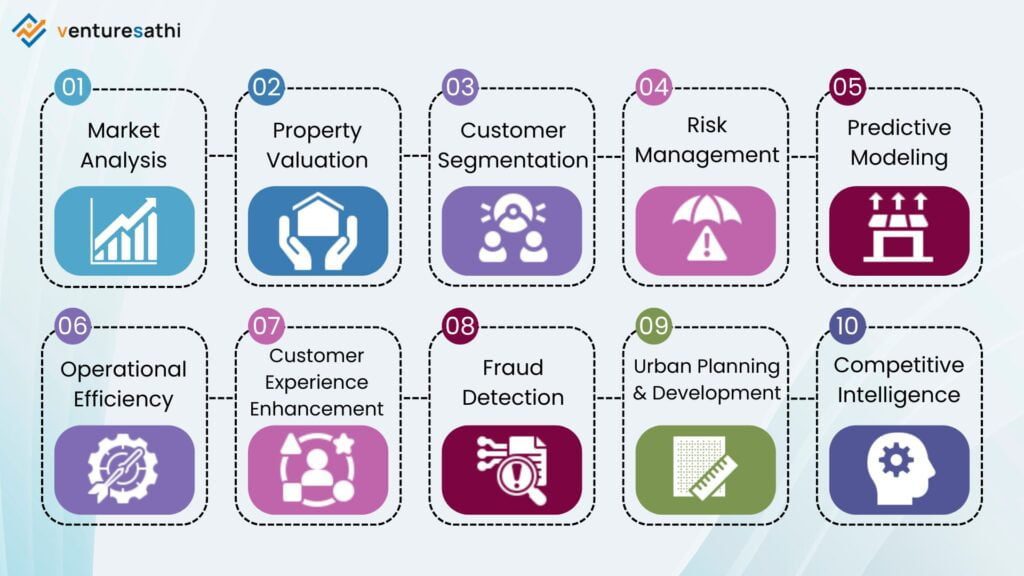

As a business solution service provider, We understand the importance of leveraging business data analytics for residential businesses in the real estate industry. Implementing business data analytics services can offer several advantages to residential real estate professionals and businesses. Here are some ways in which data analytics in residential real estate industry is useful:
1. Market Analysis:
Residential real estate data analytics allows real estate professionals to analyze market trends, property values, and demand-supply dynamics. This information is crucial for making informed decisions about residential property investments, pricing strategies, and market positioning. According to CBRE 2023 Real Estate Tech Trends Report 66% of real estate executives believe data analytics process is critical to their business success.
2. Property Valuation:
Real estate data analytics tools can provide more accurate property valuations by analyzing the residential data analysis process of historical sales, property features, and market conditions. This helps residential real estate professionals set competitive and realistic pricing for listings.
3. Customer Segmentation:
Residential real estate data analytics enables the segmentation of potential buyers or tenants based on their preferences, demographics, and behavior. This allows residential real estate businesses to tailor their marketing strategies and offerings to specific target audiences.
4. Risk Management:
Residential real estate investments involve various risks. Real estate data analytics helps in assessing and mitigating these risks by analyzing residential data analysis processes such as economic indicators, interest rates, and regional development plans.
5. Predictive Modeling:
Residential predictive analytics can forecast future trends in the real estate market, helping residential businesses anticipate changes and make proactive decisions. This includes predicting residential property appreciation, identifying emerging markets, and foreseeing shifts in demand.
6. Operational Efficiency:
Data analytics in residential real estate can enhance operational efficiency by optimizing residential property management processes, reducing vacancies, and improving resource allocation. This leads to cost savings and better overall business performance.
7. Customer Experience Enhancement:
By analyzing the residential data analysis process of customer feedback, preferences, and behaviors, residential real estate businesses can enhance the overall customer experience. This includes personalized residential property recommendations, improved communication, and more targeted marketing efforts.
8. Fraud Detection:
Residential real estate tools in data analysis can assist in detecting fraudulent activities in residential real estate transactions. This is particularly important for preventing issues such as residential mortgage fraud, identity theft, and other forms of financial misconduct.
9. Urban Planning and Development:
Governments and urban planners can use residential real estate data analytics to make informed decisions about infrastructure development, zoning regulations, and residential city planning. This can have a significant impact on residential property values and investment opportunities.
10. Competitive Intelligence:
Real-time data analytics provides insights into competitor activities, pricing strategies, and residential market positioning. This allows residential businesses to adjust their approach and stay competitive in the ever-changing residential real estate landscape.
Data analytics is a powerful tool that can transform the residential real estate industry by providing valuable data insights, improving decision-making processes, and enhancing overall business performance. Implementing robust data analytics solutions can give residential real estate professionals a competitive edge in today’s dynamic market.
Explore the profound impact of data analytics across diverse industries in our insightful blog. Read more to discover the strategic application of data analytics across different industries.
Data-Driven Sales and Marketing:
1. Analysis of Market Trends:
The primary goal is to conduct a thorough analysis of market trends with the aim of pinpointing locations and residential property types that hold significant promise. This entails scrutinizing various indicators and factors within the market to make informed decisions regarding potentially lucrative residential real estate opportunities. Tableau, Looker Studio, Power BI, and more for groundbreaking data analytics for residential businesses.
Tools used:

Tableau: Tableau dashboards provided real-time access to critical residential analysis data, empowering teams to make informed decisions promptly. By integrating residential data from disparate sources, the client achieved a unified view of operations across residential departments. Automating reporting procedures has diminished the need for manual labor and enhanced precision.
2. Use Demographic Data for Targeted Marketing:
The overarching aim is to employ demographic residential analysis data strategically in marketing initiatives, facilitating the precise and tailored targeting of buyer personas that align closely with the ideal residential customer profile. Tools in residential data analysis involve analyzing demographic information and other relevant factors to craft marketing strategies that resonate effectively with the specific preferences and needs of the target residential audience.
Venturesathi utilizes top-tier tech tools like Tableau, Looker Studio, Power BI, and more for groundbreaking data analytics. Visit our page to see how we can redefine your residential business with innovation.
Tools used:


Google Analytics is a valuable tool for residential real estate professionals, providing residential data insights into audience demographics like age, gender, interests, and geo-location. This information can be used for targeted residential marketing, geo-targeting, user behavior analysis, conversion tracking, custom segmentation, advertising platform integration, content personalization, and benchmarking, enabling residential real estate professionals to refine their residential strategies and optimize residential advertising efforts.
3. Offer Real-Time Property Insights:
The goal is to provide real-time data insights into the residential property market to potential buyers, enabling them to make informed decisions based on current trends and pricing dynamics. This approach ensures that the information provided is timely, relevant, and instrumental in facilitating well-informed residential decision-making for individuals interested in residential property transactions.
Tools used:
Google Data Studio is a residential real estate industry tool that provides real-time residential property insights through residential data analysis processes, live dashboards, customized reports, interactive maps, and collaboration. It facilitates real-time data analysis, historical comparisons, and exportable reports, enabling residential real estate professionals to stay informed, monitor residential market changes, and make data-driven decisions.
These technologies play a pivotal role in maximizing the effectiveness of sales and marketing efforts in the dynamic and competitive real estate landscape.
Discover the power of informed decision-making and strategic residential data insights. Visit our page to unlock a world of possibilities and elevate your business to new heights.
Data-Driven Property Management:
1. Automate Rent Collection and Maintenance Requests:
The goal is to improve rent collection and maintenance processes by implementing automated systems. This technology streamlines these tasks, reducing manual intervention and delays. It enhances operational efficiency, improves tenant satisfaction, and enhances the financial experience for residential property owners and landlords.
Tools used:
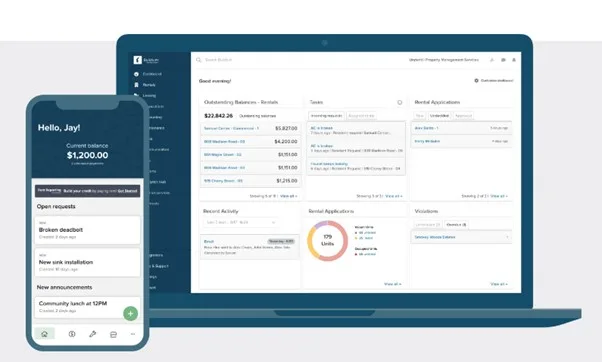

Buildium is a residential property management software that offers automated rent collection and maintenance request features. It streamlines the rental payment process, allowing for online payments and automated reminders. The platform also facilitates efficient handling of maintenance requests, enabling quick assessment and resolution. With centralized residential property management, financial tracking, and communication tools, Buildium aims to enhance overall operational efficiency for residential property managers and owners.
2. Utilize Predictive Analytics for Maintenance Anticipation:
Predictive analytics is used to proactively anticipate maintenance needs and prevent issues in residential property management. By analyzing historical residential analysis data, property managers can identify trends, schedule preventive measures, and optimize maintenance schedules, reducing the likelihood of costly repairs.
Tools used:
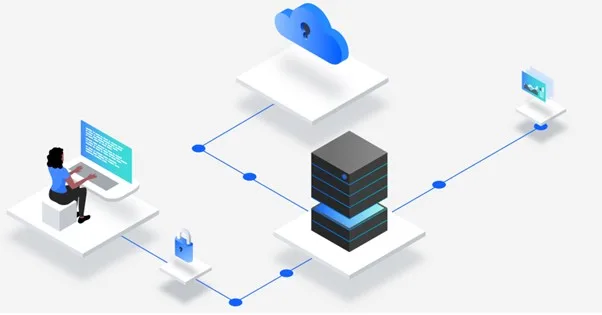

IBM Watson IoT integrates IoT devices in residential real estate for predictive maintenance. By analyzing real-time residential data from sensors, it anticipates maintenance needs, allowing proactive measures to prevent residential issues. This condition-based monitoring system optimizes resource use and minimizes downtime, providing automated alerts for timely intervention. The platform seamlessly integrates with existing residential property management systems, offering a comprehensive solution to enhance reliability and operational efficiency.
3. Personalize Communication and Services:
The goal is to customize communication and services based on residential tenant preferences, enhancing tenant satisfaction, and fostering positive relationships within managed residential properties. This is achieved through surveys, feedback, and residential data analysis, ensuring a tailored experience for each tenant.
Tools used:
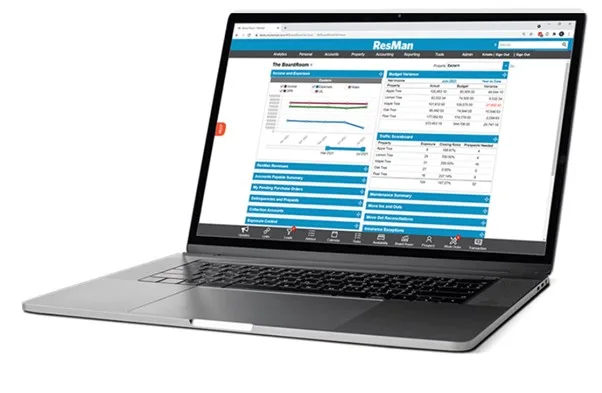

ResMan is a leading residential property management software known for its emphasis on personalized residential tenant communication. The platform enables property managers to tailor communication to individual residential tenant preferences. This is achieved through features like customized notifications, interactive tenant portals, and automated workflows. This contributes to a tenant-centric experience, fostering positive relationships and overall satisfaction within managed residential properties.
Embark on a transformative journey with Venturesathi, a technology-enabled company at the forefront of providing cutting-edge residential data analytics services.
Challenges & Solutions:
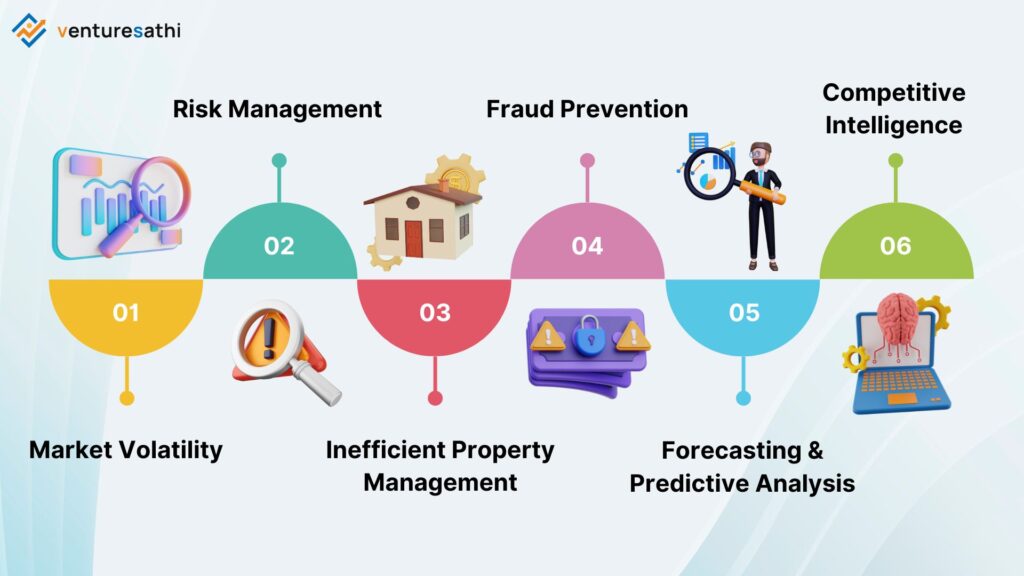

Data analytics for residential businesses has the potential to address several issues in the real estate industry by providing solutions that improve productivity, decision-making, and overall business performance. Some of the problems that residential real estate data analytics for businesses can help with are as follows:
1. Market Volatility:
Challenge: Fluctuating interest rates and economic uncertainty can lead to unpredictable residential market conditions, making it difficult for buyers and sellers to make informed residential decisions.
Solution: Real estate data analytics platforms can provide residential analysis data insights into residential market trends. They help businesses make data-driven decisions about pricing, investment, and marketing strategies.
Prop tech solutions like AI-powered residential property valuation tools can offer more accurate and up-to-date valuations in volatile markets.
2. Risk Management:
Challenge: Residential real estate investments involve inherent risks, and identifying and managing these risks is a complex task.
Solution: Residential Real estate data analytics enables the assessment of risk factors such as economic indicators, residential market conditions, and regional development plans, facilitating more effective risk management strategies.
3. Inefficient Property Management:
Challenge: Residential property management processes can be resource-intensive and prone to inefficiencies, leading to increased costs and potential tenant dissatisfaction.
Solution: Tools in residential data analysis in residential real estate optimize residential property management by streamlining processes, reducing vacancies, and enhancing resource allocation. This results in improved operational efficiency.
4. Fraud Prevention:
Challenge: Residential real estate transactions are susceptible to fraud, including activities such as residential mortgage fraud and identity theft.
Solution: Tools in residential data analysis can detect patterns indicative of fraudulent activities, enhancing fraud prevention measures in residential real estate transactions.
5. Forecasting and Predictive Analysis:
Challenge: Anticipating future residential market trends and residential property values is challenging without accurate predictive models.
Solution: Data analytics facilitates predictive modeling, allowing professionals to forecast residential market trends, residential property appreciation, and other critical factors. This aids in strategic planning.
6. Competitive Intelligence:
Challenge: Staying competitive in the residential real estate market requires data insights into competitor activities, residential pricing strategies, and residential market positioning.
Solution: Residential Real estate data analytics provides competitive intelligence by analyzing residential market trends, competitor behavior, and customer preferences. This allows residential businesses to adjust their strategies accordingly.
End Note:
Integrating data analytics and real estate is revolutionizing the residential industry, offering insights and opportunities. Utilizing residential property technologies, residential real estate professionals can navigate challenges, mitigate risks, and capitalize on emerging trends. This data-driven approach enhances every aspect of residential real estate, from market analysis to predictive maintenance and competitive intelligence.
Data analytics is essential for residential real estate, helping professionals anticipate trends, optimize processes, and navigate market volatility. This integration is paving the way for a more responsive, efficient, and customer-centric residential industry.
Revolutionize your residential business with the game-changing potential of data analytics for residential business. Unlock the secrets to success by exploring more on our page. Contact Now to stay ahead in the competitive residential arena!



